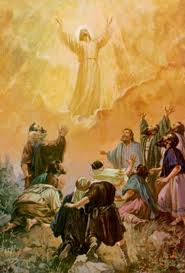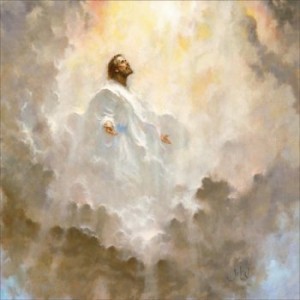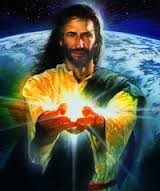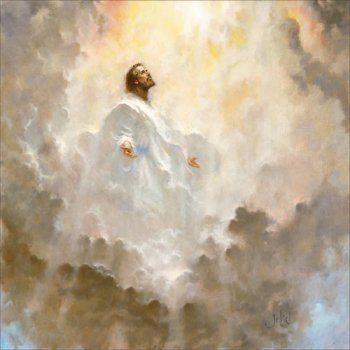
– 21-5-2023 –
ASCENSION SUNDAY – Year A
Gospel text : Matthew 28:16-20
vs.16 The eleven disciples set out for Galilee, to the mountain where Jesus had arranged to meet them.
vs.17 When they saw him they fell down before him, though some hesitated.
vs.18 Jesus came up and spoke to them. He said,
“All authority in heaven and on earth has been given to me.
vs.19 Go, therefore, make disciples of all the nations; baptize them in the name of the Father and of the Son and of the Holy Spirit,
vs.20 and teach them to observe all the commands I gave you. And know that I am with you always; yes, to the end of time.”
******************************************
We have four sets of homily notes to choose from. Please scroll down the page for the desired one.
Michel DeVerteuil : A Holy Ghost Priest, and Specialist in Lectio Divina
Thomas O’Loughlin: Professor of Historical Theology, University of Notinham.
John Littleton: Director of the Priory Institute Tallaght 24
Donal Neary SJ: Editor of The Sacred Heart Messenger
*******************************************************
Michel de Verteuil
Lectio Divina with the Sunday Gospels – Year A
www.columba.ie
General comments
When we think of the Ascension of Jesus, the account given us in chapter 1 of the Acts of the Apostles naturally comes to our minds. In fact, some may find that this passage from St Matthew’s gospel is not an Ascension story at all. This moment in the life of Jesus was significant from several points of view, however, and each account stresses some aspects over others.
We can identify three main aspects:
1. – At the end of his earthly life, and especially of his passion, Jesus makes his triumphant entry into heaven, to sit forever at the right hand of the Father.
2. – The time for forming his little community has come to an end, and Jesus sends his disciples out into the world.
3. – From now on Jesus and his followers must relate with each other differently.
 All these aspects are present in the text. But do not look for them; just enter deeply into the story and you will discover for yourself how it presents the mystery of the Ascension.
All these aspects are present in the text. But do not look for them; just enter deeply into the story and you will discover for yourself how it presents the mystery of the Ascension.
In verses 16 the disciples (depleted since they were supposed to be twelve) make their way back to Galilee, the place where the whole adventure began.
Let verse 17 speak to you deeply; the scene is very touching. Ask yourself why some hesitated.
The commission of Jesus in verses 18 and 19 is in three waves:
– a statement of his own authority;
– a three-fold command,
– and a promise.
Each section is worth meditating on by itself.
Prayer Reflection
“Mr Minister, I must remind you that you are not God, you are just a man. One day your name shall be merely a faint scribble on the pages of history, while the name of Jesus Christ shall live forever.“ …Archbishop Tutu to a government minister who had threatened the Church.
Lord, when we have committed ourselves to a noble cause we experience something of what the eleven felt when they were reunited with Jesus on the mountain in Galilee.
We may have been defeated, let one another down as they had let down Jesus, our group depleted, as theirs was without Judas.
But we are here together on this mountain and we know that no power in heaven or on earth
will conquer what we stand for.
We can go into the world teaching all nations to respect the values we believe in;
whatever happens to us, now or in the future, our cause will live for ever.
 Lord, we pray for those who at one time were touched by your grace:
Lord, we pray for those who at one time were touched by your grace:
– they turned away from drugs, alcohol, or a wrong relationship;
– forgave a deep hurt;
– began to pray again.
Now they have strayed again , and they feel helpless, without the energy to make a new start.
Teach them to do as the apostles did when, reduced to eleven, they set out for Galilee.
Tell them that there is a mountain somewhere where you have arranged to meet them again,
because once you have entered our lives you will be with us always yes, even to the very end of our lives.
Lord, we pray for those of us who are in positions of authority –
parents, teachers, leaders in the Church or the State.
Don’t let us become possessive of those in our charge.
Help us rather to be like Jesus, to let them go, when the time comes,
to whatever part of the world you call them to, and to do so without regrets,
trusting that whatever true or good they have learned from us they will teach others to observe, and wherever they are, we will always be with them.
“But when Carnival come and pass
People does go back to race and class.”
…Earl Lovelace, The New Hardware Store
Lord, for us here on the islands ofTrinidad and Tobago, Carnival is a special time of togetherness.
Other nations have similar times. We pray that we may not live these moments in isolation,
as if on some mountain far away from the rest of life.
Tell us, as Jesus told his disciples, that we have seen possibilities for ourselves,
that we must go out and teach all nations to observe what we have learned about humanity during these days, – something that will be with us always.
 Lord, we sometimes have regrets for the Church and its failures of the past.
Lord, we sometimes have regrets for the Church and its failures of the past.
We feel like the eleven setting out for Galilee.
From time to time we meet that Church again and feel very happy,
as they did when they were reunited with Jesus on the mountain.
But part of us quite rightly hesitates:
we know well that we cannot bring back the past,
that we must go in new directions,
discovering new disciples among the nations.
We need not be afraid:
Jesus promised that he will be with us always, even when we come to the end of a time.
Lord, forgive us that as a Church we limit our horizons.
Let Jesus speak to us again of the many nations who could be his disciples,people ready to be baptized and to observe all the commands he gave us.
**************************************************
Thomas O’Loughlin
Liturgical Resources for the Year of Matthew
www.columba.ie
General Comments
 Often referred to as the ‘Great Commission,’ this imposing image which concludes Matthew is functionally akin to the ascension stories in Lk 24:45-53 and Acts 1:1-11. The work of Jesus in making the Father known must be carried on by the church which is uniquely constituted with his authority (a point made more explicitly here than in Luke-Acts). The mission is presented as focused on baptism and an early liturgical formula is incorporated into the text. It is significant for our understanding of Christian origins that while for centuries, after the New Testament canon became fixed, people looked back to this text as the basis of the baptismal formula and the trinitarian structure of the creeds, in fact Matthew is derived from the actual liturgical life of the author’s community.
Often referred to as the ‘Great Commission,’ this imposing image which concludes Matthew is functionally akin to the ascension stories in Lk 24:45-53 and Acts 1:1-11. The work of Jesus in making the Father known must be carried on by the church which is uniquely constituted with his authority (a point made more explicitly here than in Luke-Acts). The mission is presented as focused on baptism and an early liturgical formula is incorporated into the text. It is significant for our understanding of Christian origins that while for centuries, after the New Testament canon became fixed, people looked back to this text as the basis of the baptismal formula and the trinitarian structure of the creeds, in fact Matthew is derived from the actual liturgical life of the author’s community.
Homily Notes
1. Luke’s images are so powerful, full of colour, and the sense of ending and going away are so strong that they dazzle us and we fail to see through them to the mystery they present. Our response to this image must not be that of asking ‘how did it happen?‘ but ‘what does it tell us today about the Christian life?’ The key question is this: ‘if Jesus is not present as he was before the crucifixion, then how is he leading us, teaching us, and being present to us?’
2. We live in the’ Age of the Church’: the Lord is not present as once in Palestine, nor as he will be after this world; rather he is to be seen through the works and words of those who are united to him through baptism: the church. The church is not an organisation to promote his cause or ideology, but the people who see themselves as acting as a group, in union with the Christ they cannot see, to bring about the kingdom. Many people each doing their bit, seeking to be honest and loving in their actions with others, and doing so as they know that these are not just random actions but made into a united endeavour by Christ towards making the Father’s kingdom come about.
3. To celebrate the ascension is to be aware that here and now one must act as a part of the church: this is how Christ is present in the world. Likewise, it is to acknowledge a moral responsibility: if one bears the name ‘Christian’ and people are scandalised by our failures – and the more someone publicly identifies him/herself with Christ as in the case of clergy and religious, the greater the offence – then this is people taking us at our word that we are Christ’s body on earth. To say one will represent Christ (i.e. make him present here and now) is an awesome mission. Older textbooks used to point to a distinction of individual failures versus collective holiness (still found in the liturgy: ‘look not on our sins, but on the faith of your church’), but this, while answering a theological problem, must not distract us from the existential predicament of the Christian: to be a disciple is to be aware of the dignity one is given in making Christ present. Moreover, examining our actions in the light of that fact is part of the cross of discipleship.
 4. We are not just people who rejoice that God loves us, while keeping our eyes fixed on Christ as the glory of the Father; we have to build a world of justice, truth, and peace. If we believe that Christ has ascended, then challenging corruption, untruth, intolerance, and all that enslaves should be characteristic symptoms of the presence of Christians in a society. The ascension is not a cosy feast: it should make us feel uncomfortable. Have we just been standing idle looking into heaven?
4. We are not just people who rejoice that God loves us, while keeping our eyes fixed on Christ as the glory of the Father; we have to build a world of justice, truth, and peace. If we believe that Christ has ascended, then challenging corruption, untruth, intolerance, and all that enslaves should be characteristic symptoms of the presence of Christians in a society. The ascension is not a cosy feast: it should make us feel uncomfortable. Have we just been standing idle looking into heaven?
*******************************************
John Litteton
Journeying through the Year of Matthew
www.Columba.ie
Gospel Reflection
We are familiar with the frequently used saying ‘to come full circle’, which means that people or things, having set out on a journey or task, have returned to where they started. They have successfully completed the cycle and are back at the beginning. This applies particularly to our thoughts about Jesus on the Feast of the Ascension.
In one sense, the Ascension celebrates that Jesus has come full circle because, having come from the Father to accomplish a specific mission, he returns to the Father having achieved what he was sent to do. And he was sent to save us from spiritual death and alienation from God that is due to our sins.
But in another sense, the Ascension marks the passing on of the baton by Jesus to his apostles. At the beginning of his public ministry, he had preached that the kingdom of heaven was close and he had challenged people to repent of their sins and believe in the Good News, which involves putting the teachings of Christ into practice in their lives. Now the responsibility for that ministry was being passed on to the apostles and disciples. They were mandated to continue his saving work, drawing all nations to the truth of the Gospel.
Jesus’ departure from the earth and his return to heaven did not mean that his apostles and disciples would remain alone in their mission. Although he would no longer be physically present, he told them: ‘And know that I am with you always; yes, to the end of time’ (Mt 28:20). So there was no need for them to worry or to be lacking in confidence because he would be spiritually present, especially in the sacramental life of the Church.
He also promised to send the Holy Spirit who would guide them in their various activities. In fact, the Church will never be alone and it will never be abandoned by the risen Lord Jesus. We celebrate that reality today as we mark the close of the postresurrection appearances of Jesus — apart from his appearance during the conversion of Saul (see Acts 9:3-7).
 The message of the Ascension is clear. The saving work of Christ is now being handed over to the Church. The baton is being passed on to us. Just as in a relay race, it is imperative that we do not drop the baton. In other words, the responsibility for passing on the faith rests with us. Let us carry the faith with courage and conviction and let us pass it on to those we meet.
The message of the Ascension is clear. The saving work of Christ is now being handed over to the Church. The baton is being passed on to us. Just as in a relay race, it is imperative that we do not drop the baton. In other words, the responsibility for passing on the faith rests with us. Let us carry the faith with courage and conviction and let us pass it on to those we meet.
We remember too the words of Jesus: ‘You received without charge, give without charge’ (Mt 10:8). So we transmit by word and example to others what has been given to us, while accepting that all authority in heaven and on earth has been given to Jesus.
The gift of faith, according to Jesus, has been freely given to us. Yet, in a sense, it comes with a price attached. Jesus’ suffering and death was the price of our salvation and, consequently, when we were baptised we assumed the duty of spreading the faith. His last words on earth, immediately before his ascension to heaven, were a missionary statement instructing his followers to go into the whole world to lead converts to the Church.
Meditation
All authority in heaven and on earth has been given to me. (Mt 28:18)
*********************************************************
Fr Donal Neary, S.J
Gospel Reflections for the Year of Matthew
www.messenger.ie/bookshop/
Fully Alive
I asked a woman once if Johnny was in the house. She pointed at a chair and said, ‘if he was here he would be there.’ He never moved far! Jesus – he is here and there. The risen lord has moved on, but he has not fully left us. His Spirit dwells in us.
The one who came to earth has now gone back to heaven, bringing with him all that is human. His body – the man of heaven and the God of earth – is now the church, and that’s us.

Before we are of any denomination or group, we are Christ’s. We are baptised into the church of Christ; we live out our faith in different denominations. Today is the feast of the whole church – we begin in him and end in him, like the Alpha and Omega, the beginning and the end, on the paschal candle. Our faith is also renewed through living with Jesus – we are partners in our mission. Our faith is also renewed in reading and praying the gospel each day.
On earth we are his body, with all our strengths and weaknesses, goodness and sin. Icons have Jesus smiling as he reaches heaven, smiling on us and living through us. We prepare for the way he is with us now next Sunday – in the Spirit. Where the qualities of the Spirit are alive, he is alive and well among us.
A breathing prayer – as you breathe in notice you are
breathing in the gift of life from God.
Holy Spirit, living in the church, living in Mary,
draw me more fully into your life.